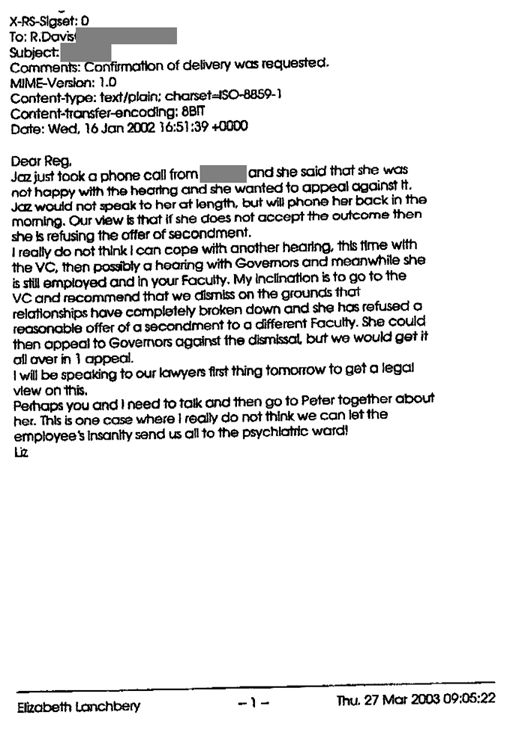


Colin Watts, Jenny Scribbins and Christine Swabey - members of the Kingston University Board of Governors
Kingston University - Providing Leadership for Higher Education?



Colin Watts, Jenny Scribbins and Christine Swabey - members of the Kingston University Board of Governors
Choice quotes by certain University officials

And this was said after the tea break in the hearing in the presence of all:-
What do you think about this last statement in light of what was said previously?
And how does this all reconcile with the principles of the Nolan Report, to which the Board of Governors claims to ascribe?
To help you to evaluate that question, the following description is taken from the Kingston University Website:
How does the Board act?
The University expects its Board to abide by the seven principles of public life as identified in the Government's Nolan Report:
• selflessness
• integrity
• objectivity
• accountability
• openness
• honesty
• leadership
And now....Here's a complete and unedited recording one of the tea breaks so that you may hear some of these comments in their full context:-
And now for a recording of yet another tea break in its entirety:-
While the University has denied that the collective grievance against Dr Fredrics was orchestrated, its own 'independent' investigator appears to have a rather different view.
In a recent interview, when asked whether or not the University had initially been given a copy of his alleged notes from interviews with complainants, Zafar Ali has this to say:
"..and I thought they [HR/Personnel] wanted all my notes. And I met with them, saying 'you can't have my notes because they told us things that may affect Human Resources.'"
Mr Ali explained further that he couldn't very well turn over the notes to HR/Personnel because he might later have to question them on their contents.
What WAS in those alleged notes? Were there, indeed, statements that implicated HR/Personnel in orchestrating the collective grievance?
If so, is THAT the REAL reason why the University has, to date, refused to turn over signed statements from complainants?
Stay tuned -- there's MUCH more to come!
Does Kingston University
Have A Culture of Bullying
The following is an example of a response from the Director of Personnel, Liz Lanchbery (Scholey) after she was informed that a staff member who had filed a grievance, which was not upheld by Mrs Lanchbery, had decided to excercise her right to resort to normal University appeals procedures.
This e-mail was sent to to the Dean overseeing the staff member, and indicates a clear intent to deny the staff member her statutory right of appeal by moving straight to a final disciplinary hearing, with an eye towards dismissing her forthwith.

Do you think that it was appropriate and within the bounds of normal dignity-at-work discourse for the Director of Personnel to refer in such disparaging terms to a staff member by asserting that she was insane?
Is the use of such language a form of workplace bullying?
Does it appear to you that staff at Kingston University who exercise their legal right of appeal are being victimized by being prematurely subjected to disciplinary proceedings and dismissal on the supposed grounds that pursuing such an appeal automatically means that working relationships have irretrievably broken down, and that such a breakdown is solely the fault of the staff member?
Does it seem to you that this basis for dismissal, also known as "SOSR" (Some Other Substantial Reason) is being used by Mrs Lanchbery as a ruse to punish staff members, who are merely trying to have their concerns addressed to the full extent permitted under normal University procedures, with an eye towards improving their working conditions?
In this specific instance, if the staff member was not prepared to simply be transferred to another faculty on a temporary basis (for six months) as a first option, and if she instead preferred to have the root causes of her concerns resolved, whilst at the same time moving on a permanent basis to a different faculty, via the vehicle of an appeal to the Vice-Chancellor and, if necessary, the Board of Governors, was it right for Mrs Lanchbery to attempt to circumvent University grievance procedures by advocating her dismissal?
Mrs Lanchbery appears to suggest that if the staff member were to be disciplined and dismissed that any appeal to the Board of Governors would be preordained to fail ("we would get it all over in 1 appeal."). How did she KNOW in advance that a decision to dismiss would be taken by Prof. Davis following a disciplinary hearing, and that it would all be "over," unless she also knew something specific about the history and normal practice of the Board of Governors with respect to whether or not it would hear a dismissal appeal by a staff member in a fair and unbiased manner?
If Mrs Lanchbery was having difficulty with the notion of following normal grievance procedures, (a central duty of her position), which includes facillitating the right of an employee to appeal an initial unfavorable decision, should she have, instead, considered resigning her position as Director of Personnel?
Based on what you have read on this site, does Kingston University appear to have a practice of breaching statutory grievance procedures?
If so, do you think this is a fair and reasonable way to conduct business?
What do YOU think?